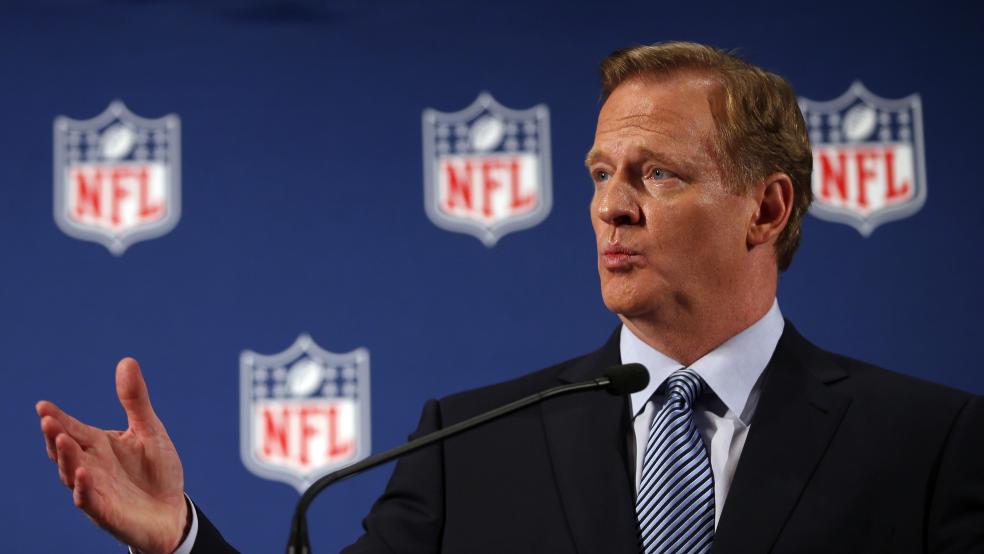Football fans are unhappy with the cheating scandal that has roiled the Super Bowl. What should worry them more is this: NFL president Roger Goodell made $44 million last year, as head of a not-for-profit. You know – a not-for-profit like the Salvation Army or the March of Dimes. That’s right – even though the NFL teams raked in about $9.5 billion in revenues last year, and the CEO of their industry association takes home one of the highest paychecks in the land, the sports league pays no taxes. Not only is the NFL tax-exempt, so is an organization called the NFL Management Council that undertakes “labor negotiations on behalf of NFL Member Clubs.” That’s how screwed up our tax system is.
Half the diehard fans tuning in to Sunday’s Super Bowl think the New England Patriots cheated. That’s the news from a poll conducted by Public Policy Polling: 50% of NFL followers are convinced that Tom Brady’s team intentionally deflated those famous footballs. Affection for the Pats has plummeted, with a majority of fans now rooting for the Seahawks.
The NFL has dragged its collective cleats, just like in the Ray Rice scandal, taking its time to interview the participants in the Pat’s blow-out defeat of the Colts. As of today, officials had still failed to speak with rather pivotal figures such as, for example, QB Tom Brady, who was the obvious beneficiary of the “Deflategate” scandal.
Related: Deflategate Follows Patriots to the Super Bowl
As unhappy as football fans are with the cheating scandal – they should be even angrier with the management of the NFL. A recent article in GQ magazine reported Goodell’s out-sized compensation package at $44 million per year for seven years, which makes Goldman Sach’s Lloyd Blankfein’s $24 million take-home look downright measly by comparison. Goodell’s comp was determined by a three-owned committee including -- guess who? -- Patriots’ owner Robert Kraft. Kraft and Goodell are known to be close buddies, raising questions about conflicts of interests; some suggested an aggressive inquiry into the deflated balls was unlikely, given that relationship. Goodell reportedly visited Kraft’s home after the AFC Championship game with the Colts. Cozy.
Even more questionable, though, and more important to the country, is the NFL’s tax-exempt status, which it claims as a 501c(6) organization. Eligible groups for that designation include: business leagues, chambers of commerce, real estate boards, board of trade and…professional football leagues.
As a not-for-profit, the NFL files a form 990 each year. For the 2013 fiscal year (ending March 2013), the NFL reported revenues of $327 million and a profit of just under $9 million. A public for-profit company with modest numbers like that would surely not be doling out tens of millions to its CEO. And, it’s not just the CEO earning big bucks. Several other officers are highly paid as well; all told, the NFL dishes out $60 million in compensation to its staff. Some 298 individuals earned $100,000 or more. Admittedly, it is the hefty revenues earned by the teams that also influences the money paid Goodell and his staff. Still, it is pay that is subsidized by taxpayers.
The NFL spent $1.2 million on lobbying in 2013; undoubtedly some of that money went to maintaining its tax-exempt status. (It states in its filing that the organization admits to some “uncertainty in income taxes.”) It also dished out more than one million in grants and gifts to organizations like $20,000 each to the National Association of Black Journalists, Big Brothers, Big Sisters of New York and the Congressional Black Caucus Foundation. More curious is $639,000 given to the NFL Foundation for “Charitable Gifts – Coach/Club Fines.” Are taxpayers underwriting club fines?
Related: The 6 Most Scandalous NFL Arrests
Senator Tom Coburn’s parting gift to voters upon his retirement last year was a scathing indictment of our tax system, called Tax Decoder. In it, he pillories many of our country’s 165 tax giveaways, including the exemptions allowed the NFL. It wasn’t his first salvo against the football franchise. In 2012 he identified the handout in his annual Waste Book, and then in 2013 he proposed the PRO Sports Act, which would forbid any professional sports organization earning revenues above $10 million from filing as a nonprofit organization. His bill would have prevented not only the NFL, but also the PGA and the National Hockey League from receiving taxpayer assistance.
The bill failed to gain widespread support. "If you are in a state that has a pro football league or runs a pro golf tournament, the career politicians are afraid to touch it," Coburn said at the time. He also noted, “Tax earmarks are essentially tax increases for everyone who doesn’t receive the benefit…In this case, working Americans are paying artificially high rates in order to subsidize special breaks for sports leagues. This is hardly fair.”
That seems an understatement. Football’s popularity is huge, and despite the controversies, more than one hundred million people will tune into this weekend’s Super Bowl. Americans love the NFL – but as questions about the league’s governance pile up, they may get tired of helping to foot the bill. It’s up to Congress to clean up our tax system.
Stay tuned sports fans.
Top Reads From The Fiscal Times:






